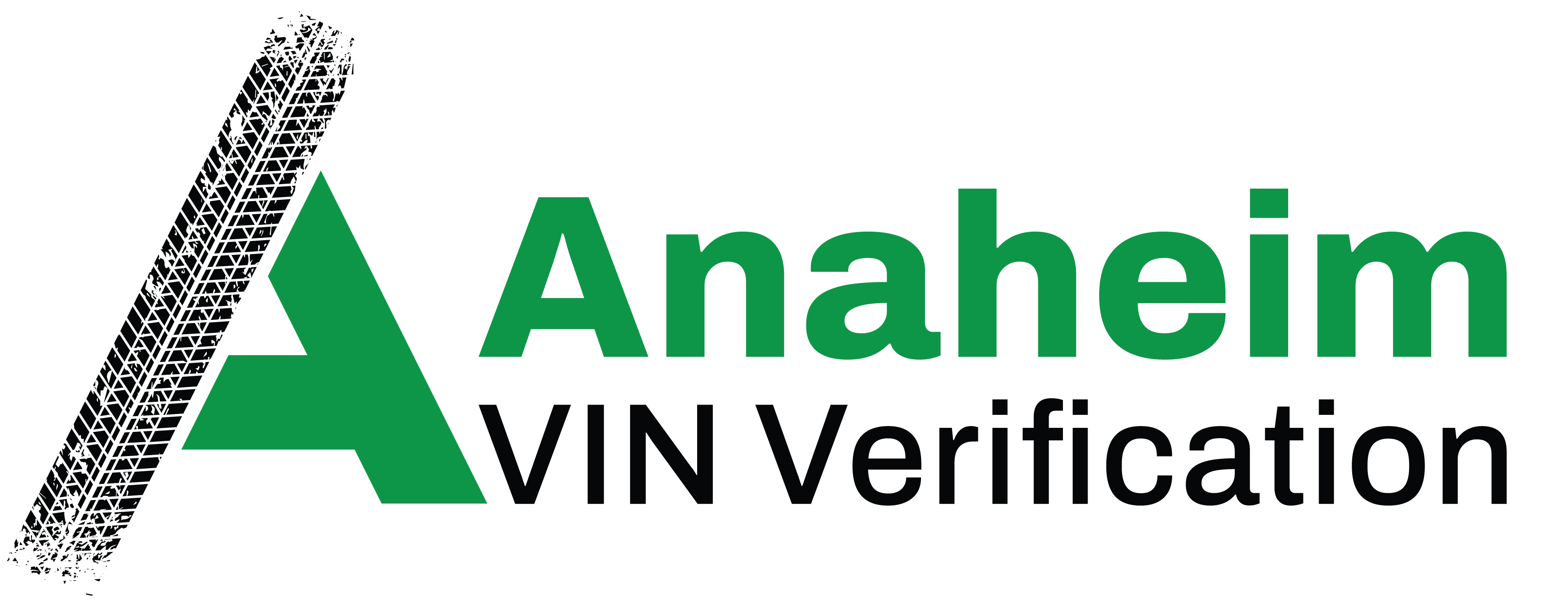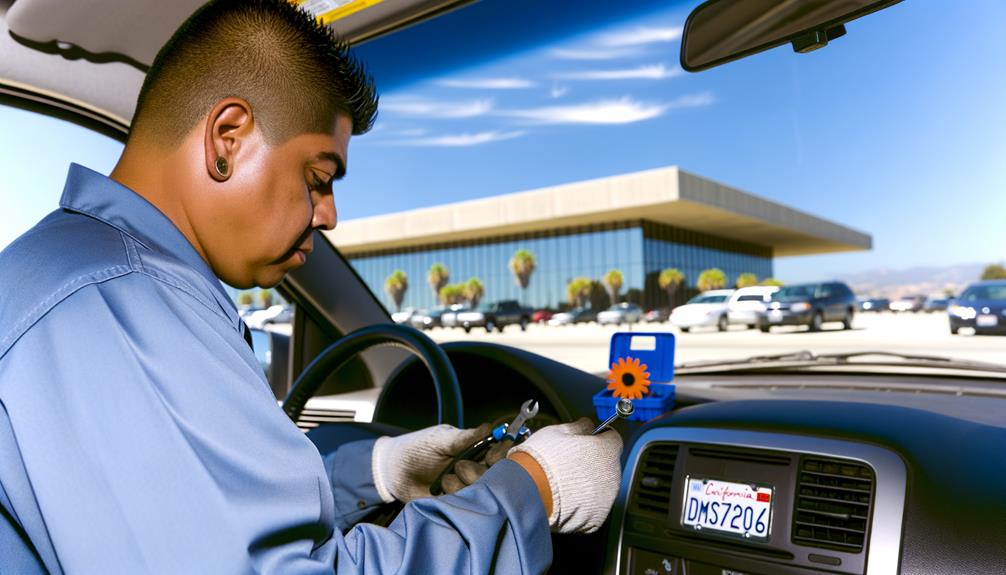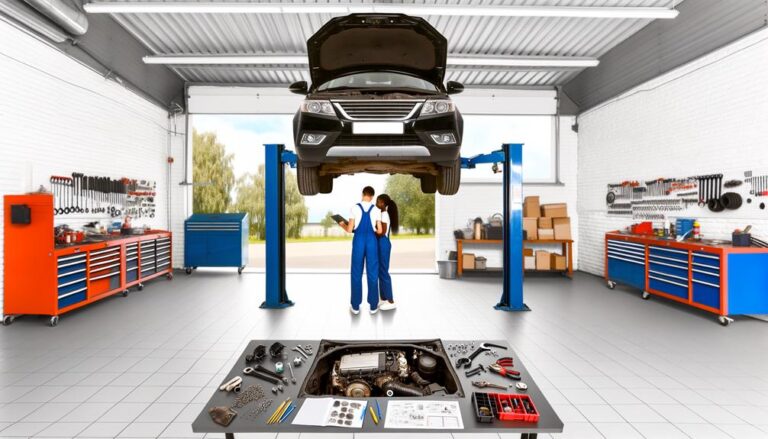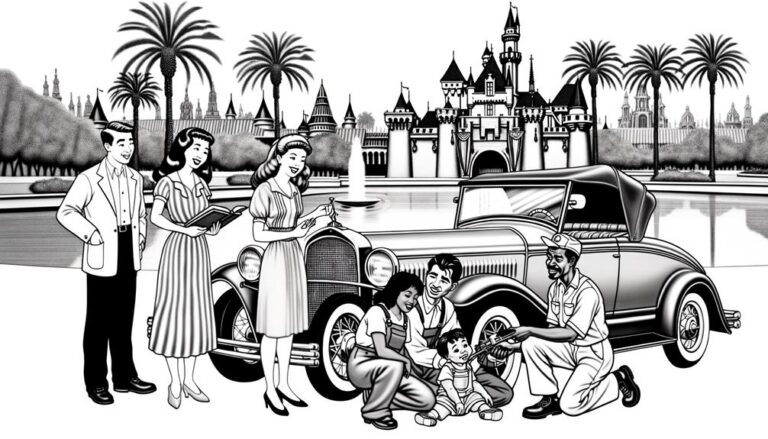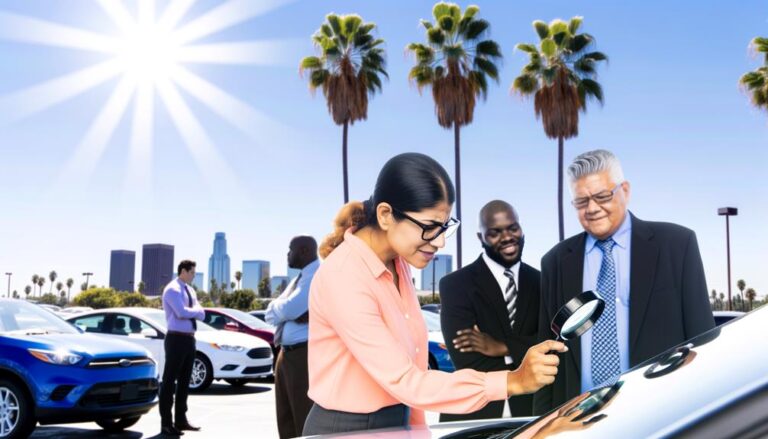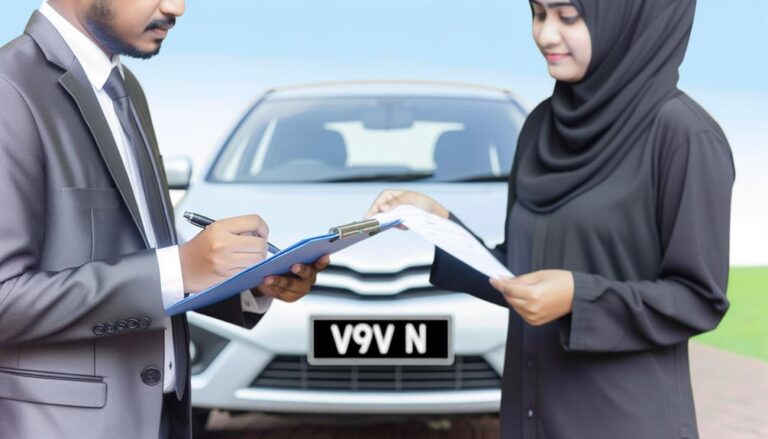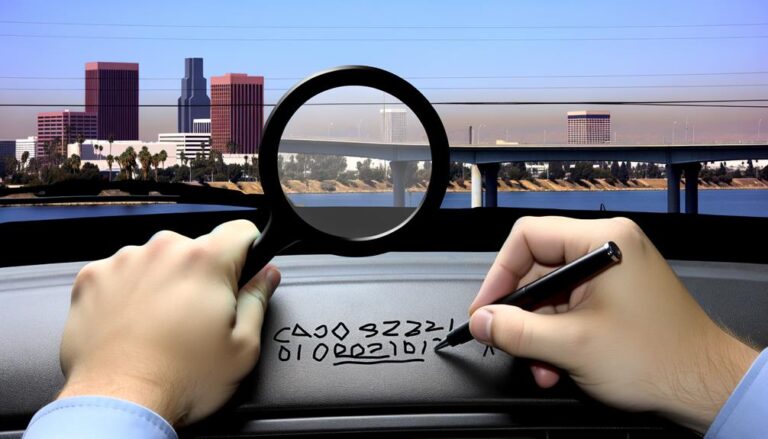Understanding California DMV Requirements for VIN Verification
If you're planning to register a vehicle in California or transfer its title, you'll need to navigate the DMV's requirements for VIN verification. This pivotal step ensures that your vehicle complies with both legal and emissions standards by validating its identity against state and national records. Whether you've got an out-of-state car or a salvaged beauty, understanding the nuances of this process, from who's authorized to inspect your vehicle to completing the necessary paperwork, can streamline your experience. But what are the common pitfalls, and how can you avoid them? Let's explore the intricacies and potential hurdles you might face in this process.
Vehicle Registration Procedures

Before you can register your vehicle in California, it must pass a physical inspection to verify its details and ensure it's not stolen or illegally owned. This step is crucial to safeguard your freedom on the road, adhering strictly to the California Vehicle Code.
The VIN verification is particularly vital as it matches your vehicle's identification number against state and national databases.
During this inspection, officials also check that your vehicle meets California's stringent emissions standards. It's not just about following rules; it's about ensuring your ride contributes to a cleaner, more sustainable environment.
If you're bringing a vehicle from out of state, remember this process will help ensure your vehicle aligns with California's specific requirements. Should your vehicle have a history as a junk or salvage vehicle, you'll need a CHP Certificate of Inspection to proceed. This certificate is your ticket to confirming the vehicle's integrity and legality, allowing you to hit the road with confidence.
For those of you with specially constructed vehicles, a separate verification ensures your custom build complies with all necessary safety and emissions standards. By embracing these procedures, you're not just registering a vehicle; you're asserting your right to drive with freedom and responsibility.
Ownership and Vehicle Types
Now that you understand the VIN verification process, let's examine the regulations governing ownership and the types of vehicles affected.
In California, whether you're buying a sleek sports car or a rugged truck, you need to prove legal ownership, which is outlined under VC §4150, 4150.2, and 4450. These sections demand specific documentation to transfer ownership, ensuring you're recognized as the legal owner without a hitch.
If you're dealing with a vehicle that has a branded title, like salvage or junk, be prepared for extra steps. You'll have to undergo a VIN inspection to validate the vehicle's status before you can proceed with registration. This is crucial to make sure you're not stuck with a lemon, and it's all detailed in VC §4453 and 9255.1.
For military members stationed in California but not residents, you've got specific guidelines to follow for your vehicle registration and ownership verification. It's all about making sure you comply with the local laws while serving the country.
These regulations are designed to keep your transition smooth and your focus clear, so you can enjoy the freedom of the road, unburdened by bureaucratic hassles.
Fees and Financial Compliance
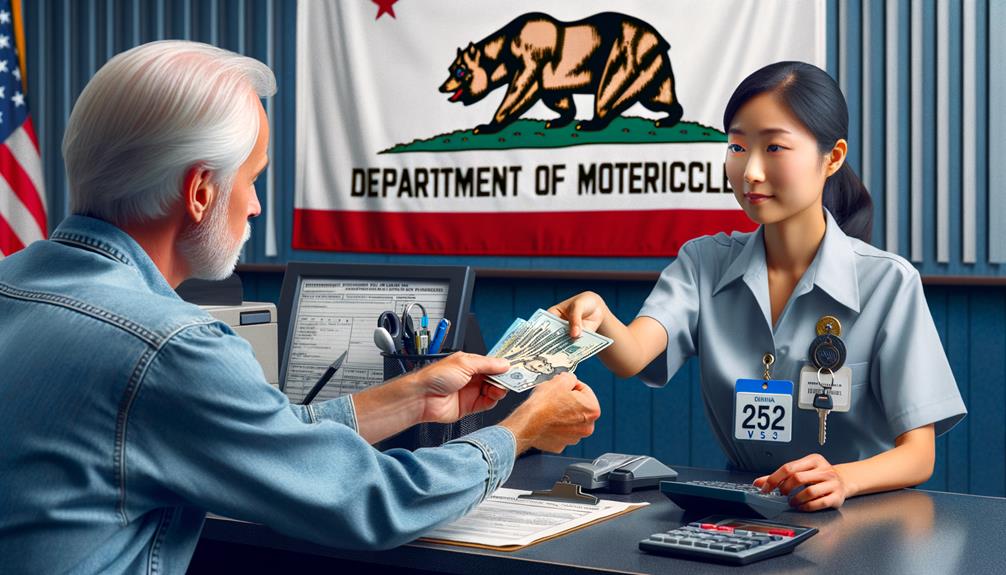
While VIN verification via DMV and CHP is free, you'll need to budget for potential fees if opting for private verification services. Private verifiers often charge not just for the inspection but also for travel, especially if you're located far from their base. The costs can vary widely, so it's wise to shop around and factor these expenses into your financial planning.
When you're diving into the world of VIN verifications, especially if you're considering becoming a licensed Vehicle Verifier yourself, there are specific costs you should be aware of. The California DMV requires a $51 non-refundable application fee for those applying for a Vehicle Verifier License. This fee ensures your application is processed, but remember, it's non-refundable, so make sure you're committed before you pay.
Furthermore, maintaining your Vehicle Verifier License isn't just a one-time cost. There's a $15 renewal fee every term, plus a $1 fee that supports family programs. These aren't just random charges; they're part of your financial compliance and commitment to maintaining your licensure in good standing with the California DMV.
Staying financially compliant means also keeping up with your vehicle insurance, a non-negotiable part of vehicle ownership in California, safeguarding you against potential penalties.
Documentation and Corrections
You'll often need to gather specific documents for VIN verification, including the vehicle's VIN, detailed information, and your valid ID, ensuring the process is handled correctly.
The California DMV mandates that during this verification, you complete the REG 31 form. This critical document records your vehicle's current condition and all pertinent vehicle details, making sure everything matches up to existing records.
Now, if you spot any discrepancies, especially with the vehicle identification number or the description on your vehicle title, you're looking at needing corrections. It's vital to address these promptly to avoid any hitches down the road.
According to VC §4159, any corrections to vehicle title, whether they're about ownership details or errors in the VIN itself, must be documented and submitted to the California DMV. This ensures all your records are up-to-date and accurate.
Permits and Special Plates
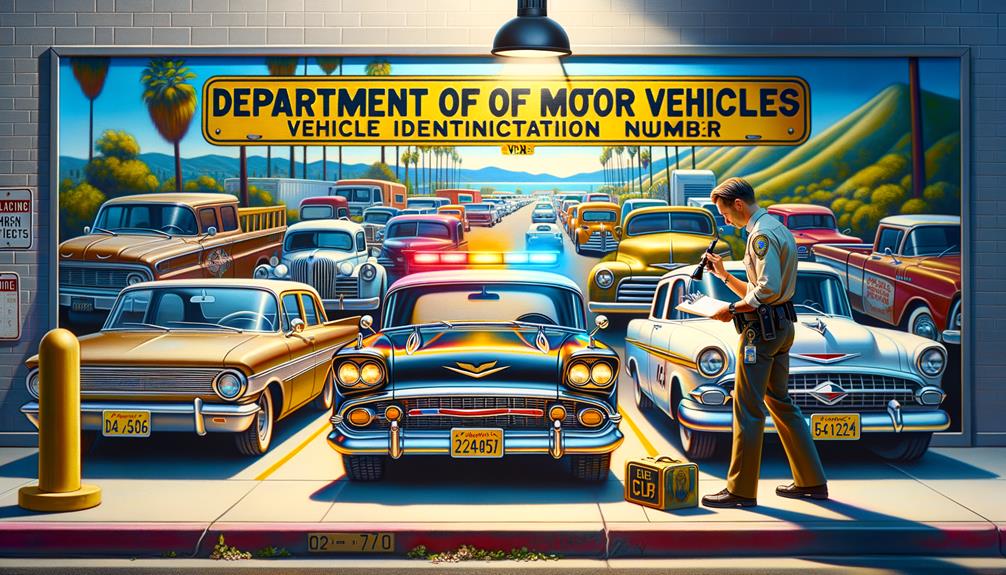
Various permits and special plates are available through the California DMV, each tailored to meet specific needs and regulations.
If you're involved in disaster relief, you can obtain special permits for your vehicles under the California Code of Regulations (VC § 4005). This allows you to operate freely during emergencies, ensuring you're right where needed without delay.
For your commercial vehicles, one-trip permits are essential for compliance with state laws (VC § 4003). These permits enable temporary operation, letting you manage your tasks efficiently without long-term commitments. Furthermore, if you're driving an environmentally-friendly vehicle, Clean Air Vehicle (CAV) decals (VC § 5205.5) offer access to coveted carpool lanes, speeding up your daily commute.
For those requiring accessibility options, disabled person parking placards and ID cards are regulated under VC §§ 22511.55 and 22511.56. These ensure that parking is the least of your worries, providing you the freedom to move about with ease.
Lastly, express your passion or support with special license plates—be it environmental, collegiate, or military—regulated by VC §§ 5101, 5024, and 5101.4. These plates not only personalize your vehicle but also declare your affiliations proudly as you drive.
Vehicle Verification Processes
To register your vehicle in California, you must undergo a VIN verification process that ensures the vehicle's details match its ownership documents. This step is crucial for your freedom to drive without legal hassles. The process involves a physical inspection to check the vehicle identification number (VIN) and engine number, ensuring they align with what's on your paperwork.
During this inspection, you'll need the REG 31 form, a vital document that records the findings of the verification. This form is your ticket to meeting registration requirements smoothly. Remember, VIN verification isn't just a formality; it's a safeguard that the details of your vehicle, like make, model, and year, are accurately recorded in the official system.
This process is mandatory for several situations such as registering vehicles from out of state, or re-registering those that have been deemed salvage or junked. It's about ensuring that your vehicle is rightfully yours and meets all legal standards.
You'll appreciate knowing that once you pass this step, you're all set to enjoy the freedom of the open road, with all your vehicle's credentials in check.
Authorized VIN Verification Entities
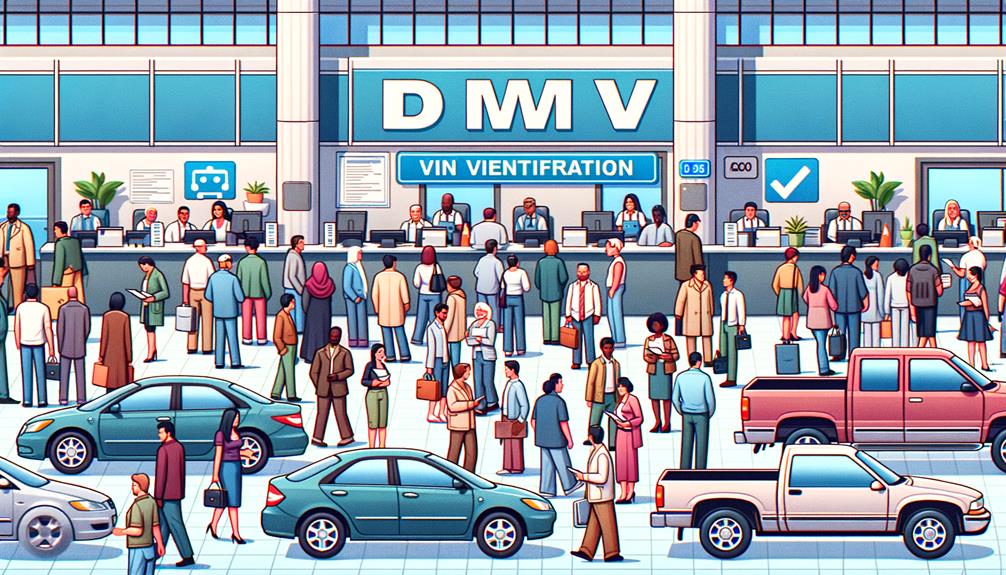
Several entities are authorized to perform VIN verifications in California, including the DMV, CHP, AAA, and licensed vehicle verifiers. When you're aiming to complete your VIN verification, you've got the freedom to choose from a variety of authorized entities. This flexibility allows you to select a service that best fits your schedule and location preferences.
The California Highway Patrol (CHP) is a reliable option, particularly for unique or specialized vehicles. Meanwhile, AAA offers convenient services for its members, making it a straightforward choice if you're already affiliated.
Don't overlook licensed vehicle verifiers; these professionals provide personalized services and can often come to you, saving you a trip. For those stationed in military bases, military police are equipped to handle VIN verification, ensuring compliance without needing to leave the base.
Similarly, companies like Quick VIN Verification cater to those who prefer a quick, efficient service that minimizes hassle.
VIN Verification Process Details
Now that you know where you can get your VIN verified, let's look at what the verification process entails.
To begin, you'll need to complete a REG 31 form. This vital document captures all essential details about your vehicle, such as the VIN, make, model, and emissions label, during a physical inspection. It's your first step towards ensuring your freedom on the road with a properly registered vehicle.
During the VIN verification, an authorized inspector—be it a DMV employee, a member of the California Highway Patrol (CHP), a peace officer, an AAA representative, or licensed private verifiers—will check your vehicle to confirm that the identification numbers match those on your paperwork. This step is crucial for registering out-of-state vehicles or re-registering vehicles that have been salvaged or junked.
Remember, while the DMV and CHP offer this inspection free of charge, turning to licensed private verifiers or auto clubs might incur inspection fees. However, these entities often provide greater scheduling flexibility, which can be a significant advantage if you're looking to expedite the process.
Make sure to schedule your appointment in advance, especially if opting for verification through the DMV or CHP, to avoid any delays in your vehicle registration journey.
Transferring Vehicle Titles

When buying a used vehicle from a private owner in California, you must transfer the title to ensure legal ownership. It's your right to own your ride without any chains of past obligations. To kickstart this, ensure the vehicle has a clean title. This means no liens or legal hitches that could trip you up down the road.
You'll need a licensed verifier to conduct a vehicle verification inspection. This isn't just bureaucracy; it's a smart step to confirm the details of your vehicle match what's on record. During this check, the verifier will inspect the VIN number and other critical details against California regulations. Remember, this step is crucial to ensure you're not buying into someone else's problems.
Don't forget to fill out the REG 31 form during this process. This form is part of your title transfer application and is vital for updating the records to reflect your ownership. If the original title's missing or damaged, complete this verification within 90 days to avoid any legal snags.
Embrace the freedom of your new journey, but make sure you're starting on the right foot with all the necessary legal boxes checked.
Frequently Asked Questions
What Do They Check for VIN Verification in California?
They check the VIN against ownership documents, ensuring details like engine number, make, model, and emissions compliance are correct. It's essential for registering vehicles from out-of-state or after significant modifications.
Does AAA Do VIN Verification in California?
Yes, AAA does perform VIN verification in California. You'll need to be a member and it's wise to book an appointment. Note, they can't verify salvage vehicles—keep that in mind for your needs.
Who Can Do a Verification of Vehicle in California?
You can get your vehicle verified in California by authorized DMV verifiers, peace officers, licensed vehicle verifiers, and certain auto club employees like those from AAA, or opt for private verification services.
What Is a Reg 31 in California?
A REG 31 form in California is what you'll need during a vehicle inspection. It's filled out by authorized personnel to ensure your vehicle's details match its records, helping to prevent fraud.
